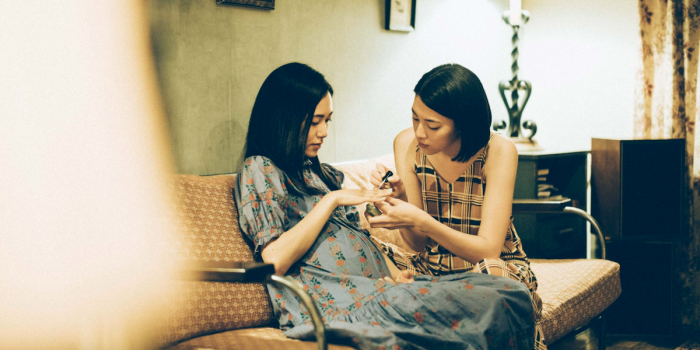Director: Hajime Tsuda
Queer East Film Festival 2021 review
Through its story of two housemates feeling their way through the consequences and demands of an unplanned pregnancy, Hajime Tsuda’s Daughters captures that identity-forming period in the lives of most twenty-somethings where the last traces of youthful abandon finally give way to the longterm responsibilities of adulthood.
Though friends Ayano (Junko Abe) and Koharu (Ayaka Miyoshi) have already crossed several of the obligatory markers of maturity by the time we meet them – including renting their own flat and working full-time jobs – their drunken nights and wandering days still carry that distinct air of adolescent aimlessness. This relatively breezy life chapter comes to a close for both of them, however, after the revelation that Ayano is pregnant. In the nine bittersweet months that follow, relationships are redefined and familiar routines are forced to change, as the two friends gradually come to realise which parts of their old life they’ll have to lose and which parts are worth holding onto.
Naturally, when Ayano first learns of her unexpected pregnancy, the news is something of an emotional gut punch for the young woman. Tsuda tracks her anxious, disoriented state in the hours that follow through a series of almost hallucinogenic shots that fix her in centre of the frame, alienated from her various environments as they move and change around her. This narrative bombshell, however, turns out to be a rare anomaly in a film that seems primarily interested in the quiet revelations that form slowly with the passing of time.
As a writer, Tsuda keeps the narrative flashiness to a minimum but there’s a subtle, poignant unpredictability to his observations of human behaviour. Take the scene where Koharu shows Ayano a baby book for dads that she bought. At first, Ayano laughs at the purchase, teasingly exclaiming, “You’re not the dad!”, before her reaction quickly transitions into tears. It’s a telling moment that reveals new layers to Ayano’s emotional state, while raising thoughtful questions about the nature of her relationship with Koharu, but the exchange is made all the more resonant by the fact that Tsuda chooses not to dwell on it.

Time is continuously marching forward for Ayano and Koharu, and Tsuda offers some familiar visual reminders of this universal truth, both literal (the onscreen text announcing each new month) and symbolic (the elegant trees by the local river that change with the seasons). But more compelling than any one image is the way the film’s aesthetics adapt to suit the changing circumstances of the two leads. Backed by an eclectic soundtrack that ranges from folk to shoegaze to pop-rap, Tsuda’s visuals move from the vibrant montages of Ayano and Koharu’s nights out, to the relatively restrained sensibilities of their sobering daylight hours, while indulging in the occasional sequence of hazy blurs and dissolves for moments of wistful contemplation. Much like the film’s two leads, the style seems to be figuring itself out as it goes along.
That being said, much of Daughters is characterised by empty spaces, evoking both the alienating nature of the Tokyo cityscape as it towers over the characters, and the sense of freedom and opportunity suggested by its endless network of streets and alleyways. The pacing usually follows suit, allowing Tsuda time to linger on the quieter moments of Ayano and Koharu’s days, while expanding on the story’s themes through a series of welcome narrative tangents.
This is a film that feels refreshingly unburdened by the demands and clichés of its plot, allowing its emotions to emerge organically and unforced, while effectively skipping some of the more obvious dramatic beats that you’d expect from an unplanned pregnancy story. Even in the film’s less engaging spots – where Tsuda’s penchant for the subdued takes its toll and the mood becomes too diluted for its own good – Daughters remains true to its own sensibilities, making the occasional lapse in viewer interest just that little bit easier to forgive.
Throughout this journey, it’s interesting to note that the biological father has virtually no presence, serving as little more than an occasional conversation topic for the two leads. But though the oblivious father’s future involvement in the child’s life – or lack thereof – remains a lingering question at the film’s end, Daughters is ultimately more noteworthy for its depiction of a family dynamic where such a presence isn’t necessary. So while Ayano herself may note in a moment of mixed emotions that Koharu is, indeed, “not the dad,” Tsuda’s gently immersive film seems to shrug off the need to apply any label whatsoever to Koharu’s role in this relationship.
At its heart, Daughters is the story of two women who, through a mix of choice and circumstance, learn to commit to a new phase in their lives – accepting all the changes and sacrifices that come with it – and yet, even after the transition is made, the world that Ayano and Koharu inhabit remains open and filled with possibility.





